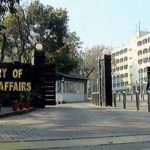ISLAMABAD, Nov 24 (APP):The National University of Science and Technology (NUST) again brought laurels to the country by receiving the most modern PANDORA instrument and access to the GEMS satellite from NASA for real-time air quality data monitoring.
The NUST not only received the US National Aeronautics and Space Administration’s (NASA) latest satellite rather became part of the most modern geostationary orbit-based satellite observations (GEMS-Geostationary Environmental Monitoring Spectrometer) of air quality as the first institute of the entire region to receive the equipment to record, collate, and calibrate real-time air quality data, the Head of Department Environmental Sciences, NUST Institute of Environmental Sciences and Engineering (IESE) Dr Muhammad Fahim Khokhar told APP on Thursday while sharing the achievement.
Dr Khokhar said, “Air quality has become a global issue with its impact on the society, economy, industry, diplomacy, public health and natural resources in addition to environmental science.”
Especially, he said Asia with its rapid increase in industrialization and population, was regarded as an important source region of global scale emission. “Thus, it is crucial to monitor the concentration of relevant gases and aerosols over Asia in high temporal and spatial resolution from geostationary orbit satellite.”
He said that there was no such facility available in the country to have 24/7 satellite-based data for air pollution.
The NUST’s Institute of Environmental Sciences and Engineering (IESE) has emerged as a globally trusted institution for high-level research projects and the hard work of its faculty, especially, Dr Fahim Khokhar said.
The Pandonia Global Network (PGN)’s Pandora is the outcome of a programmatic shift by the National Aeronautics and Space Administration (NASA) and European Space Agency (ESA) towards establishing long-term fixed locations focused on providing long-term quality observations of the total column and vertically resolved concentrations of a range of trace gases.
A major joint objective is to support the validation and verification of more than a dozen low-earth orbit and geostationary orbit-based UV-visible sensors.
He added that the prestigious global space agency NASA trusted NUST with the responsibility to become the focal point in the region for its geostationary satellite and being part of the PGN.
The national varsity was earlier secured from the DepartmentState-USe US lead by Duke University and Dr Muhammad Fahim Khokhar (co-lead) to develop low-cost air quality sensors.
The NUST low-cost quality sensors have been deployed across the country including Islamabad and Rawalpindi, he added.
The Pandora equipment received from NASA comprised a Field Box, Spectrometer and Sensor Head and costs around $55,000 dollars.
Dr Khokhar informed that the latest gadget was a very critical tool for the students of BS, MS, MPhil, and PhD students that would provide the students an opportunity to get hands-on experience on the most modern equipment and interact with global experts.
The PGN provides real-time, standardized, calibrated and verified QA/QC AQ data whereas the PGN participants were primarily comprised of governmental and academic researchers and technicians.





